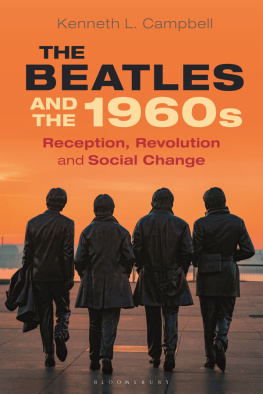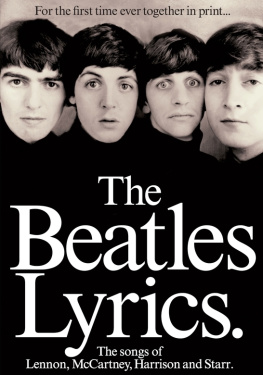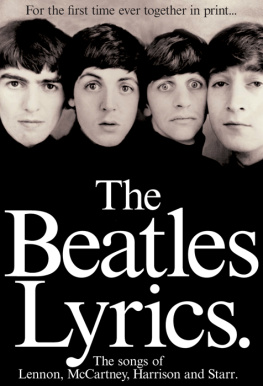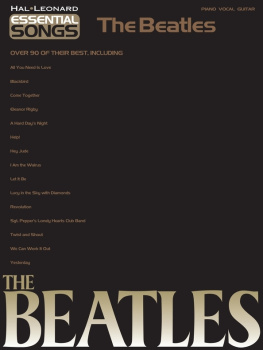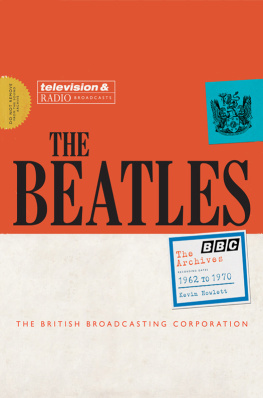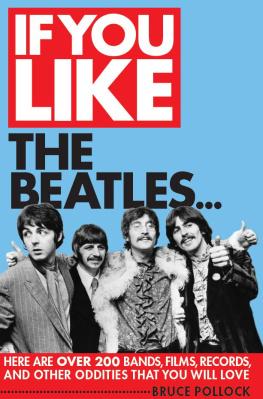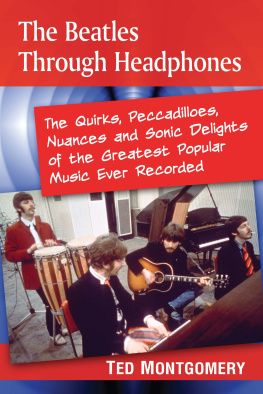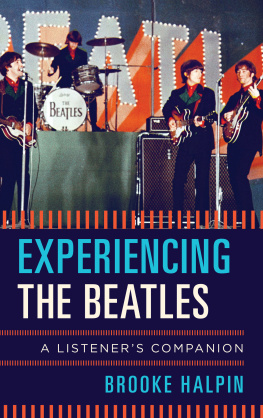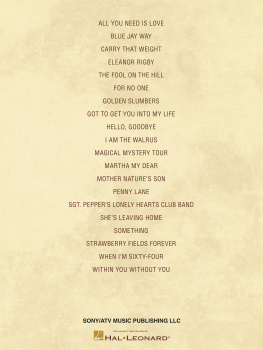
THE BEATLES AND THE 1960 s
THE BEATLES AND THE 1960 s
Reception, Revolution, and Social Change
Kenneth L. Campbell

For Millie
Contents
First, I would like to thank Emily Drewe, Abigail Lane, and Beatriz Lopez for believing in this book and for their support throughout the writing of it. Special thanks to Tedi Pascarelli for help with the research and for reading the entire manuscript and her valuable and thoughtful comments and editorial corrections. Thanks also to Melissa Davis, who read a large portion of the manuscript and provided so much encouragement and helpful feedback. In addition, much gratitude to Kalyani and the Newgen KnowledgeWorks team for the fantastic job they have done on the copy editing and production of the book.
At Monmouth University, Ken Womack offered great support and many good recommendations; he has also given me the opportunity to write about the Beatles in several of his edited books. His own work on the Beatles has provided much insight and inspiration. I am incredibly grateful to Melissa Ziobro for serving as my oral history guru and all of her helpful guidance and advice. I would also like to thank Chris DeRosa, Maryanne Rhett, Hettie Williams, Judy Nye, and Bea Rogers, particularly for their support of my courses on the Beatles. Thanks to Owen Flanagan for his musical expertise. Sherry Xie always does an amazing job of tracking down all of the books I need through Interlibrary Loan. Beth Meszaros helped me talk through the possibilities for this project before I ever started working on it; I have also benefited from the numerous research presentations she gave over the years to my Beatles classes. I would be remiss if I did not say thank you to all of the students in those classes over the past ten years, as well as my peer learning assistants, especially Sarah Lewis who took the course as a freshman and worked as my PLA for the next three years. Chris Ellwood helped me with the student newspaper archive at Monmouth. Finally, Monmouth University generously supported this book with a Grant-in-Aid for Creativity and a Faculty Summer Fellowship in 2020 so I could finish it on time.
Oliver Lovesey gave me some great ideas and helped me formulate my thoughts on the Beatles at Woodstock; a longer treatment of that subject appears in a volume he edited for Popular Music and Society in 2019. Robert Brosh generously shared his recent book Rock History: The Musicians Perspective with me at a key stage in the process. Walter Everett kindly granted me permission to quote from his remarks at a conference in September 2019 commemorating the fiftieth anniversary of Abbey Road . His books have been a special source of inspiration.
I could not have written this book without the willing participation of all of the people I have interviewed or supplied me with their remembrances of the Beatles and their experience in the 1960s. These include the following: Mark Angellini, Claude Assante, Roy Auerbach, Jeff Ayers, Jane Barnes, Ivan Bell, Tom Blazuki, Ross Bloomfield, Alan Chevat, Julius DAmelio, Artie Doskow, Rebecca Duncan, Ed Eichler, Bobby and Nick Ercoline, Marbie Foster, Stan Green, Michael Halbreich, Robin Levine, Michael McEntarfer, Lenny Mandel, Ruth Mandel, Tom Noce, Janet Nugent, Peter Orenzoff, Len Pniewski, David Scher, Bob Schiffer, Allen Sorrentino, and James Vignapiano. In addition, it was great to interview Wade Lawrence, the director and senior curator at the museum at Bethel Woods, at the site of the original Woodstock Music and Arts Festival. I especially want to thank Larry Kane for talking with me and contributing a great perspective and unique insights based on his personal experiences with the Beatles. Eraldine Williams-Shakespeare and Debora Graas helped me with the transcriptions of the interviews that I conducted for the book.
I would also like to thank my family and friends, especially my friends, Ken (Hans) and Clare Fahnestock, for helping me to keep my sanity during a global pandemic.
My wife, Millie, to whom I have dedicated this book, used to sing, Do You Want to Know a Secret? to me when we were teenagers and deserves my lasting thanks for so many more wonderful memories in my life.
This book places the Beatles career and music into the context of the political and popular culture of the 1960s, with special attention to how listeners at the time would have heard and interpreted their songs and albums. This book also examines the complex interactions between the Beatles lives, songs, and times. Taking for the most part a year-by-year approach, each chapter views the changing sensibility of the Beatles songs, less with a view to their internal development as artists, an approach skillfully employed by Walter Everett, Kenneth Womack, and others, and more with a view to the external influences absorbed, consciously or unconsciously, from the culture surrounding them. For the purposes of this book, I have conducted interviews with about three dozen individuals who were born between the years 1949 and 1957, almost all of whom were at least 12 or 13 when the Beatles first broke throughin 1963 in Britain and 1964 in the United States.
Next page
